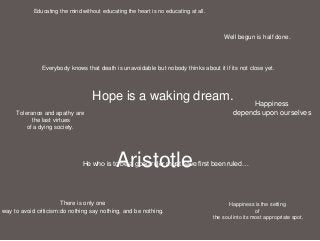Aristotle(OCR AS Philosophy of religion)
•Download as PPTX, PDF•
5 likes•849 views
Report
Share
Report
Share

Recommended
More Related Content
Featured
Featured (20)
Product Design Trends in 2024 | Teenage Engineerings

Product Design Trends in 2024 | Teenage Engineerings
How Race, Age and Gender Shape Attitudes Towards Mental Health

How Race, Age and Gender Shape Attitudes Towards Mental Health
AI Trends in Creative Operations 2024 by Artwork Flow.pdf

AI Trends in Creative Operations 2024 by Artwork Flow.pdf
Content Methodology: A Best Practices Report (Webinar)

Content Methodology: A Best Practices Report (Webinar)
How to Prepare For a Successful Job Search for 2024

How to Prepare For a Successful Job Search for 2024
Social Media Marketing Trends 2024 // The Global Indie Insights

Social Media Marketing Trends 2024 // The Global Indie Insights
Trends In Paid Search: Navigating The Digital Landscape In 2024

Trends In Paid Search: Navigating The Digital Landscape In 2024
5 Public speaking tips from TED - Visualized summary

5 Public speaking tips from TED - Visualized summary
Google's Just Not That Into You: Understanding Core Updates & Search Intent

Google's Just Not That Into You: Understanding Core Updates & Search Intent
The six step guide to practical project management

The six step guide to practical project management
Beginners Guide to TikTok for Search - Rachel Pearson - We are Tilt __ Bright...

Beginners Guide to TikTok for Search - Rachel Pearson - We are Tilt __ Bright...
Aristotle(OCR AS Philosophy of religion)
- 1. Aristotle Educating the mind without educating the heart is no educating at all. Everybody knows that death is unavoidable but nobody thinks about it if its not close yet. Hope is a waking dream. Well begun is half done. He who is to be a good ruler must have first been ruled… Happiness is the setting of the soul into its most appropriate spot. Tolerance and apathy are the last virtues of a dying society. There is only one way to avoid criticism:do nothing say nothing, and be nothing. Happiness depends upon ourselves
- 2. Summary biography Aristotle was born in Macedonia. He was a famous greek philosopher, scientists and educator. At the age of 17 he moved to Athens where he joined Plato’s academy. He moved to turkey and spent his time there instigating science and practically biology.
- 3. Aristotle’s 4 causes • The material cause- refers to the matter or substance that is made form something ( e.g book is made form papers which is the matter). • The formal cause-what makes the thing recognisable :its structure, shape and activity. • The efficient cause-the cause of the thing coming to exist as it is(it refers to why that thing exists). • The final cause- the ultimate reason why thing exists.
- 4. Plato v Aristotle • Aristotle’s realism was a rejection of Plato’s idealism. Plato and Aristotle each produced a work of political philosophy. Plato produced the ‘Republic’(focused on the ‘ideal state’ )and Aristotle produced the ‘Politics’(designing a society that acknowledges human selfishness. Aristotle was thinking about how we create a WORKING government, human selfishness.he calls this state that is balanced, a state that are really forced to work together but at the same time we maintain human property.Aristotle said: ‘ I would rather be someone’s cousin in the real sense than be someone’s son by Plato’s standards’ where everybody’s everybody’s son.
- 5. Prime mover • Aristotle believed everything was subject to change-“You never step into the same river twice”Heraclitus- Aristotle agreed with this -everything is subject t change. • Aristotle thought that there was a chain of ‘causes’ stretching back to something that caused motion, but remains unmoved itself-he called this ‘prime mover’- “For everything that changes is something and is changed by something and into something”. Aristotle believed that change is eternal-there cannot been a first change without some vent to have happened just before the change. Aristotle calls the source of all movement and change the ‘prime mover’. • The prime mover is not the efficient cause of the change- its the purpose or reason for motion.He believed that the prime mover was the final cause. However there is a problem with calling the final cause GOD as God cannot be changed if God is to remain the unmoved mover. • The prime mover causes movement not through “pushing”, but by inspiring or attracting movement. The prime mover attracts the movers as it is the final goal or purpose towards which all material things moves towards. • Aristotle did argued that the prime mover is made of spiritual energy. God’s activity is ‘pure thought’
- 6. Judeo- Christian God Vs Aristotle’s Priem mover Similarities Differences Aristotle argued that nothing existed before the prime mover started the chain of causes. Judeo - Christian God creates the universe from nothing. the god of the Bible plays an active part in bringing things being. Aristotle’s unmoved mover is indifferent to creation. Judea - Christian God is an intelligent designer who crafts a purposeful world. Aristotle also believed that the universe was a purposeful place. The God of the Bible is active, willing things to come into being. Aristotle’s unmoved mover is passive, causing things to happen through attraction. They are both immaterial. The God of the Bible desires a relationship with humanity. Aristotle’s unmoved mover spends eternity thinking ply of himself.